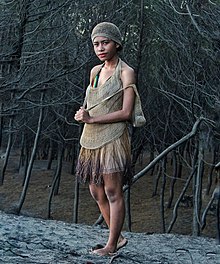The Mee (also Bunani Mee, Ekari, Ekagi, Kapauku, Tapiro) are a people in the Wissel Lakes area of Central Papua, Indonesia.[2] They speak the Ekagi language.
Bunani Mee | |
|---|---|
 Native Mee women wearing traditional clothing | |
| Total population | |
| 157,000 | |
| Regions with significant populations | |
| Languages | |
| Ekagi language, Indonesian language | |
| Religion | |
| Christianity (95%), Islam (2%), other ethnic religions (3%)[1] |
Epidemiological significance
editIn the 1970s, an investigation was conducted by Indonesian physicians concerned about the high rates of Ekari people hospitalized for burns. The study revealed many Ekari people were suffering from neurocysticercosis, caused by the pork tapeworm, Taenia solium, which had been previously unseen in Papua New Guinea. As a result, many had been suffering seizures while near fires, injuring themselves in the process. Pigs infected with the tapeworms had been introduced to the island previously by the Indonesian unknowingly.[3] Though based on modern genetic study, tapeworms in Papua are the oldest among Indonesian haplotypes. They diverged from lineages in Bali at minimum 25,000 years BP, hence unlikely to be recent introduction.[4]
Representations in media
edit- National Geographic aired the film Tribal Odyssey: The Chief Who Talks to God: The Mee, Papua in 2005 as part of its Tribal Odyssey series.[5]
See also
editReferences
edit- ^ "Ekagi in Indonesia".
- ^ Carmel Budiardjo & Soei Liong Liem (1988). West Papua: The Obliteration Of A People. TAPOL. ISBN 0-9506-7515-6.
- ^ "How the West (Papua) Was Won." Cultural Survival. N.p., Dec. 1987. Web. 12 Apr. 2017.
- ^ Yanagida, Tetsuya; Swastika, Kadek; Dharmawan, Nyoman Sadra; Sako, Yasuhito; Wandra, Toni; Ito, Akira; Okamoto, Munehiro (2021). "Origin of the pork tapeworm Taenia solium in Bali and Papua, Indonesia". Parasitology International. 83. Elsevier BV: 102285. doi:10.1016/j.parint.2021.102285. ISSN 1383-5769.
- ^ "Tribal Odyssey". Archived from the original on 2013-12-03. Retrieved 2012-03-01.